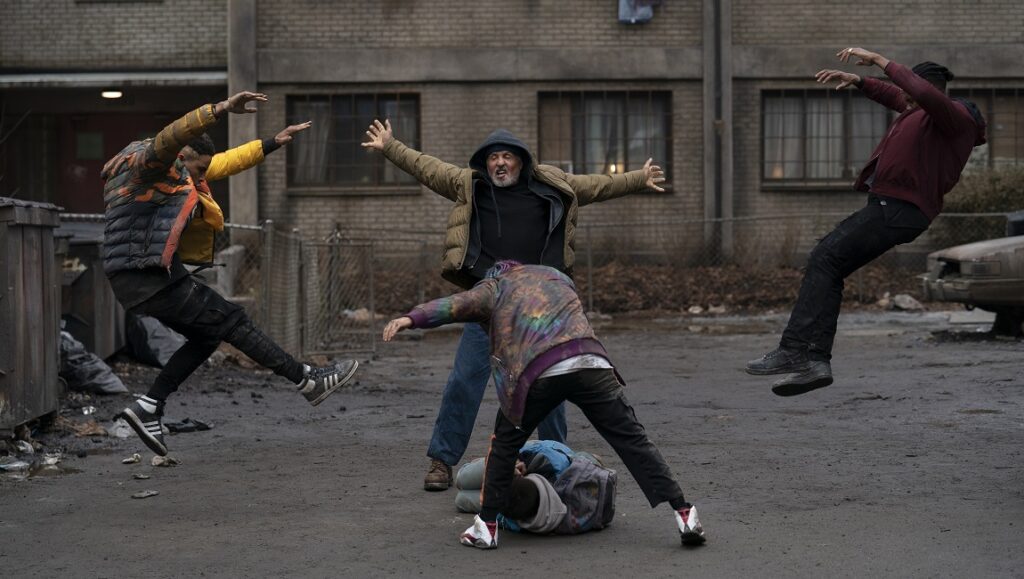Samaritan is a shallow, abysmally paced actioner that fails to deliver any impressive action.
A drab, joyless affair, the new Sylvester Stallone vehicle Samaritan finds the septuagenarian action star trying to split the difference between an Eastwood-like meditation on aging and a good old-fashioned punch bonanza. It’s unfortunate that neither efforts are particularly successful. Helmed by Julius Avery, whose 2018 film Overlord suggested a talent for genre mashup and gooey gore gags, Samaritan gets bogged down in endless exposition, listless fight scenes, and a useless “reveal” that adds nothing of interest to the proceedings.
In fact, Stallone’s reluctant superhero barely appears in the first act. Instead, we are introduced to Sam (a very good Javon Walton), a pre-teen who lives in the bad part of fictional Granite City (actually filmed in Atlanta and presumably some bland studio backlots) with his loving but over-worked single mom, Tiffany (Dascha Polanco). They’re struggling, on the verge of being evicted from their apartment, and so Sam takes up with some local hoodlums to make a quick buck. Their smash-and-grab robbery goes wrong, and the gangbangers take Sam to their boss Cyrus (Pilou Asbæk) to take the fall for the screwup. But Cyrus sees something in the scrappy young boy and decides to take him under his wing. Meanwhile, Sam is also obsessed with tracking down local hero Samaritan, long missing and presumed dead after an epic battle with his twin brother, the arch-villain Nemesis (their history is detailed in a pre-credit animated sequence that we’re not going to get into here. It’s very standard hero/villain stuff). Journalist Albert Casier (a barely utilized Martin Starr) has a number of ideas about Samaritan surviving the apocalyptic battle, turning his theories into a cottage industry of books and YouTube videos. Sam is convinced that Samaritan is hiding somewhere in the city, even keeping a list of “suspects” on his closet door. He has zeroed in on Joe Smith (Stallone), a burly, taciturn janitor who communicates largely in grunts. It’s a foregone conclusion that Joe is indeed Samaritan, rendering Sam’s investigation largely moot, and it takes an interminable amount of time for Joe to finally reveal himself when he saves Sam from a brutal beating at the hands of the aforementioned hoodlums.
Curiously, the film plods along on these parallel threads for some time; Sam struggles to reconcile his adoration of Samaritan’s good deeds with the increasingly evil actions of Cyrus, while Joe plays coy about his abilities while moping around. The Joe/Sam dynamic is built around cliches, but Sly almost sells it with his aged, tired body and sad hounddog eyes. Meanwhile, Cyrus has decided that he needs to take up the mantle of Nemesis. You see, to the poor people of Granite city, Nemesis was a folk hero while Samaritan was just another cop, protecting the interests of the moneyed ruling class. It’s an interesting idea, largely cribbed from Black Panther, where the villainous Killmonger was also portrayed as an intelligent, anti-imperialist champion of the oppressed who’s also evil (an academic could get a lot of mileage out of screenwriters putting Internet slang and social justice slogans into the mouths of murderers). Regardless, the idea is barely explored. Once Cyrus breaks into a police evidence room and steals Nemesis’ helmet and supercharged hammer, it’s just a matter of time before a showdown with Joe comes to pass.
Cliches and plot holes are hardly a dealbreaker in action movies, as long as the action is good. The recent Day Shift is a perfect example of a minor, eager-to-please time-waster that nevertheless features remarkable fight choreography and a steady flow of kick-ass stunt work. Samaritan, on the other hand, lumbers around mired in its own plot, while the infrequent fight scenes quickly become dull and repetitive. Joe/Samaritan’s powers are never exactly spelled out, other than super strength and invulnerability (bullets don’t seem to hurt him). But his only move appears to be some punching and tossing guys a few feet. It’s hardly awe-inspiring, and the PG-13 rating limits Avery’s propensity for gross-out punchlines. It’s a film in conflict with itself, between the fine performances and deft, mostly sympathetic scenes of realistic urban poverty and the useless superhero hijinks that are shoehorned in. Stallone clearly wants to comment on his own advanced age and even, perhaps, his gradual receding from the spotlight (beyond the Creed films, his attempts at franchise extensions with Rambo and The Expendables have been met largely with shrugs). Samaritan went through numerous delays and release date changes before finally getting absorbed into Amazon when the mega-monopoly purchased MGM in its entirety. For a film of Samaritan‘s quality, disappearing into the maw of streaming is perhaps better than never getting released at all, but only barely.
You can currently stream Julius Avery’s Samaritan on Amazon Prime Video.


Comments are closed.